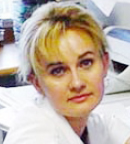
Tyler Iorizzo
Tyler Iorizzo, a PhD candidate in physics at UMass Lowell’s Advanced Biophotonics Laboratory, has won international recognition for his work in developing an imaging device that could lead to improved diagnosis and treatment of certain skin cancers.
Mr. Iorizzo received an Educational Award from Edmund Optics, a supplier of high-precision optics for the optical industry. The award consists of $7,500 worth of Edmund Optics products, which will be used in the Advanced Biophotonics Lab. Mr. Iorizzo is part of a team that developed a device called an optical polarization imager (OPI), which may help doctors identify the margins of nonmelanoma skin cancer prior to surgery. As a result, it may be possible to remove the malignant tumor with more precision and result in fewer complications and a quicker recovery for the patient.
“Imaging with the OPI is completely harmless and noninvasive. It doesn’t use x-ray or high-intensity laser, so it’s perfectly safe for the patient and the doctor,” said Mr. Iorizzo.

Anna Yaroslavsky, PhD,
“Currently, there is no comparable tool available in the market,” said Anna Yaroslavsky, PhD, UMass Lowell Associate Professor of Physics and Director and Founder of the Advanced Biophotonics Laboratory and inventor of the OPI technology. “Surgeons basically look at the outline of a cancerous lesion visually and, based on their experience and training, decide where and how much tissue to cut. In many cases, errors can arise because they can’t see the margins of the tumor very well.”
Mr. Iorizzo added that imaging with the OPI may be easier for patients to tolerate. “The procedure produces better cosmetic outcome and repair of the incision site,” he added.
Clinical Application
The most effective treatment for nonmelanoma skin cancer usually involves Mohs surgery, which is time-consuming, labor-intensive, and costly. “Tumor boundaries associated with [nonmelanoma skin cancer] are difficult to detect based on visual assessment alone. This results in inefficient removal of the cancerous tissue, which can lead to recurrence of the tumor,” said Mr. -Iorizzo. “Our optical imaging system can identify disruptions in the skin’s collagen structure caused by the tumor, allowing for precise in vivo mapping of the skin cancer before surgery.”
The Advanced Biophotonics Lab is also conducting research on breast, brain, and kidney cancers in collaboration with Harvard Medical School, Massachusetts General Hospital, and UMass Medical School. ■

